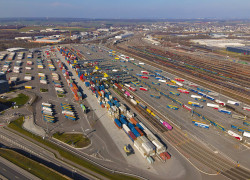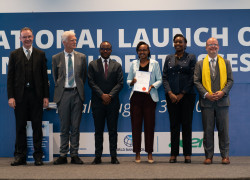According to the PwC Luxembourg Report, the Grand Duchy is an emerging FinTech innovation hub
Luxembourg is on a FinTech Journey
FinTech, a game-changing alloy of technology and finance, blends innovation-focused technology companies with traditional financial sector players. The merger of these two different business approaches, the tech and the traditional one, is the bedrock of the future financial sector landscape. Luxembourg, with its modern financial institutions, is well positioned to take reigns of the FinTech revolution.
Adapting to change: rising FinTech awareness in Luxembourg
With its vibrant ecosystem of financial institutions, technology companies, R&D centres, and a highly diversified and specialised economy, Luxembourg is an emerging FinTech innovation hub. “The country already provides factual support to innovation by encouraging private and public funding, and by building up a true start-up support ecosystem: the government put FinTech as one of the six key domains of the Digital Lëtzebuerg Strategy launched in 2014, aimed at turning Luxembourg into a digital nation, and mandated Jeremy Rifkin to examine and advise on how the Grand Duchy can leverage its FinTech potential” says Gregory Weber, FinTech Leader at PwC Luxembourg.
The Grand Duchy provides an attractive ecosystem not only for FinTech companies, but for business in general. Adding its innovative and responsive regulatory environment, Luxembourg is the epitome of a FinTech aware business environment. Local market players seem to perfectly understand that by embracing the FinTech business model, the Grand Duchy is on the right path to further strengthen its recognition and reputation among investors, clients and the start-up community.
“Internet, mobility, social networking and the rise of price comparison websites have changed the game over the past decade and have created a new generation of customers who demand simplicity, speed and convenience in their interactions with financial providers and even with their peers” highlights Gregory Weber. Traditional market players have started adapting to new market demands. The need to meet changing customer expectations with new offerings (resulting in an increased focus on the client experience) is top-of-mind for 86% of Luxembourg respondents when asked about the most important impact of FinTech on their business.
Business at risk: 26% of the traditional financial sector in Luxembourg may be lost to FinTechs
According to the survey, nearly all (94%) respondents from the traditional financial industry believe that part of their business is at risk of being lost to standalone FinTech companies. Incumbents believe that more than a fourth part (26%) of their business could be at risk due to further development of FinTech, though FinTech companies anticipate that they will be able to take over only 10% of incumbents’ business (compared to 33% globally). “In this regard, the asset & wealth management industry is feeling particular pressure from FinTech companies” adds Gregory Weber.
On the other hand, insurers in Luxembourg may be underestimating the threat posed by FinTech with an estimated share of business at risk of only 10%, compared to 21% for global insurance participants.
However, not only are traditional financial industry providers concerned about losing part of their business to FinTechs, they are also aware that their ways of working and product offerings will be challenged and possibly transformed.
Blockchain: high on the agenda in Luxembourg, but still underexplored
Blockchain represents the next evolutionary jump in business process optimization technology. If blockchain gains wider acceptance, it could lead to significant changes in back-office roles, as ownership could be transferred without the need for intermediaries and reconciliations would disappear once there is a shared ledger that all parties agree on. “In Luxembourg, the majority of respondents (60%) recognises blockchain’s importance and is much more willing to respond to blockchain when compared to global respondents (except for asset & wealth managers). However, none of the respondents declares being extremely familiar with the technology. Only 17% believes being very familiar with it while one in five Luxembourg industry players is not familiar with blockchain at all” highlights Gregory Weber.
The ability to collaborate, at both a strategic and business level, with a few key partners could soon become a competitive advantage of Luxembourg financial industry.
How is the Luxembourg financial sector dealing with FinTechs?
Almost half (44%) of Luxembourg financial sector players believes that FinTech is integrated at the heart of their corporate strategies. However, more than 50% either does not have a fully aligned corporate FinTech strategy or FinTech does not have any role or impact within the strategic corporate agenda. There is no clear industry-wide trend in terms of how traditional players deal and engage with FinTechs. More than a third (34%) engages in joint partnerships with FinTech companies, 31% buys and sell services to FinTech companies, 14% rebrands purchased FinTech services (white-labelling), 14% launches their own FinTech subsidiaries, one in ten establishes start-up programs to incubate FinTech companies and 7% sets up venture funds to fund FinTech companies. Surprisingly, 21% of Luxembourg participants does not deal with FinTech at all. When both parties (traditional financial and FinTech companies) are asked about the biggest impediments when dealing with one another, incumbents name regulatory uncertainty (68%), IT security (45%) and differences in operational processes (45%). FinTechs, on the other hand, are mostly concerned about different management culture when dealing with incumbents (67% of respondents) and IT security (50%) is also a concern.
While the responses from Luxembourg participants are generally aligned with the global ones, the required financial investments for Luxembourg FinTechs when dealing with traditional financial companies (50%) clearly stand out. Globally, this issue is FinTechs’ smallest concern, raised only by 28% of survey participants.
“FinTech is re-shaping the financial sector at such a pace that those players that stay behind today might not even recognise the sector in five years. With their potential, Luxembourg players, however, have all the capabilities to stay at the heart of the FinTech revolution. The golden rule: start embracing FinTech now” concludes Gregory Weber.
Communiqués liés
RSA launches technology and management liability insurance s...
RSA Luxembourg, part of Intact Insurance Specialty Solutions, today announces th...
Lancement d'une nouvelle connexion intermodale entre Bettemb...
CFL multimodal a le plaisir d'annoncer le lancement de sa nouvelle connexion i...
Experts from LUNEX award first micro-credentials in Rwanda o...
The Rwanda Ministry of Education (MINEDUC) formally inaugurated Syllabi, a publi...
ERG Notes that ENRC Secures Landmark Victory as Court of App...
Eurasian Resources Group (ERG), a leading diversified natural resources group he...
LetzToken et La Vie est Belle annoncent leur partenariat ouv...
«?LetzToken?», plateforme de tokenisation pionnière basée à Luxembourg, et ...
ERG announces a Pre-Export Finance Facility Agreement based ...
Eurasian Resources Group (“ERG”, “The Group”), a leading diversified nat...
Il n'y a aucun résultat pour votre recherche







